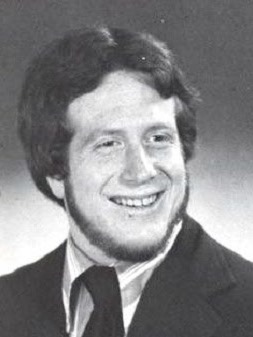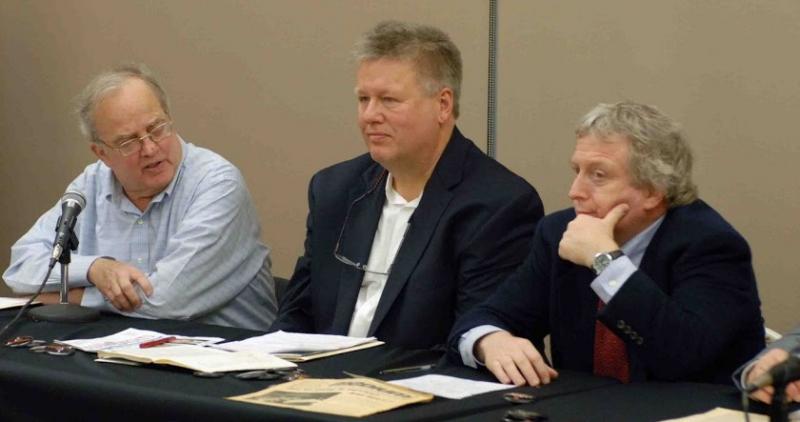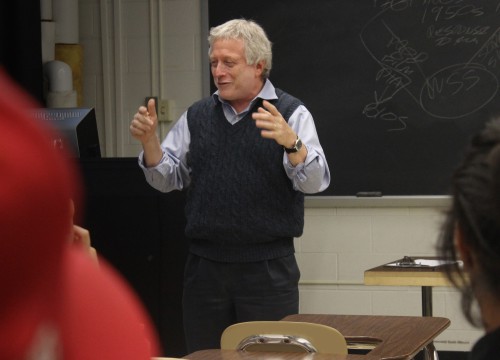Last updated on May 13, 2025
 Robert W. Snyder, a 1977 graduate of Livingston College at Rutgers University-New Brunswick, is a Professor of Journalism and American Studies at Rutgers-Newark. He writes widely on New York City history and journalism.
Robert W. Snyder, a 1977 graduate of Livingston College at Rutgers University-New Brunswick, is a Professor of Journalism and American Studies at Rutgers-Newark. He writes widely on New York City history and journalism.
Snyder graduated from Livingston College with majors in History and Urban Communications (Journalism). He earned a doctorate in American History at New York University.
In 2018, the Livingston Alumni Association (LAA) honored Snyder with the Livingston College Distinguished Alumni Award, for his work as a scholar and historian, and for his unflagging efforts to recognize and celebrate the history of Livingston College.
Snyder and five other exceptional graduates of Livingston College were honored at an awards celebration on Tuesday, March 20, 2018, at Rutgers.
 He has a very strong record of teaching, scholarship, journalism, museum work, and publication, and has received high recognition for the quality of his projects and his commitment. From 2000 to 2005 he served as director of the Journalism program in Rutgers-Newark’s Department of Arts, Culture and Media, and from 2009 to 2014 as director of the graduate program in American Studies.
He has a very strong record of teaching, scholarship, journalism, museum work, and publication, and has received high recognition for the quality of his projects and his commitment. From 2000 to 2005 he served as director of the Journalism program in Rutgers-Newark’s Department of Arts, Culture and Media, and from 2009 to 2014 as director of the graduate program in American Studies.
In addition to teaching at Rutgers-Newark and elsewhere, Snyder has worked as journalist, a journal editor, and a documentarian. He has carried out projects with journalists, museum curators, and documentarians to share history with a broad public. He has written widely and lectured on New York City history, oral history, workers, the media, painting and the arts, and other topics.
He is the author of Crossing Broadway: Washington Heights and the Promise of New York City; The Voice of the City: Vaudeville and Popular Culture in New York; and Transit Talk: New York’s Bus and Subway Workers Tell Their Stories.
He is the co-author of Metropolitan Lives: The Ashcan Artists and Their New York, which won the Barr Prize of the College Art Association. With Rebecca Zurier, he co-curated an Ashcan Artists exhibit of the same name the exhibit at the National Museum of American Art at the Smithsonian Institution. He served as a consultant to the Museum of the City of New York for exhibits on the Spanish Civil War and New York City, the mayoralty of John V. Lindsay, and the cartoons of Denys Wortman. With the Newark Museum, he has developed educational programs for teachers and the general public.

Formerly the editor of Media Studies Journal, Snyder also worked at Channel 13/WNET, Newsday, the journalism review More, and the Tarrytown Daily News.
At Newsday he was a member of a special projects team that explored immigration and ethnic and racial diversity in New York City. Snyder also provided expert commentary about Depression-era New York City for the DVD version of Peter Jackson’s film “King Kong.”
 His reviews and articles have been published in scholarly journals such as the Journal of Urban History, Journal of American History, Journalism and Reviews in American History, and in general interest publications such as The New York Times, The Nation, the Columbia Journalism Review, the Jesuit magazine America, the Jewish Forward, and The Star-Ledger.
His reviews and articles have been published in scholarly journals such as the Journal of Urban History, Journal of American History, Journalism and Reviews in American History, and in general interest publications such as The New York Times, The Nation, the Columbia Journalism Review, the Jesuit magazine America, the Jewish Forward, and The Star-Ledger.
He has been interviewed by The New York Times, National Public Radio, WNJN, the History Channel, and the BBC on history, urban affairs, and media issues.
In 2015-2016 Snyder served as a Fulbright Scholar, teaching an American studies course called “America the Visual: Conflict, Diversity and Democracy in American Culture” at the Hankuk University of Foreign Studies in South Korea.
“This was a version of a course that I’ve experimented with at Rutgers–Newark,” Snyder said. “It examines visual expression in culture that look at conflicts. We look at how artists, photographers, TV producers, journalists have presented defining conflicts in American culture. Some of the most interesting sessions came from comparing Korean and American attitudes toward shared experiences.”
Snyder has remained active in the LAA and maintained strong connections with many students from his days on campus. Most important, he has remained committed to the ideals of the college. In later 2012 and early 2013 he recorded a three-part interview with the Rutgers Oral History Archives (ROHA), talking at great length about his experiences at Livingston College. At his 40-year Rutgers reunion, Snyder encouraged his classmates to contribute their stories to the ROHA as well.
And in 2010, he was one of the panelists at the LAA’s discussion on the history and impact of the Department of Journalism and Urban Communications and journalism programs at Livingston College and the School of Communication and Information.
As a journalism and history major in the 1970s, Snyder embodied the social action and justice aspects of Livingston’s mission. He was active in student politics as a leading reporter and editor on the Livingston Medium and gave a rousing speech on commencement day in the spring of 1977 where he encouraged students “to be proud” of their years at Livingston. When it came time to speak out and act to preserve’s Livingston’s mission in the face of changes at Rutgers University, Snyder worked tirelessly to convince the administration to preserve Livingston’s mission of social justice and inclusion.
Snyder’s passion for Livingston burns deep to this day, highlighted by a blog article he wrote after attending an on-campus program dedicated to preserving Livingston’s history and impact on the overall Rutgers University community and the world. Even though he went on to do graduate work at New York University and teach at Princeton University, Snyder remained loyal to Livingston College. He says it was at Livingston where he first actively engaged in politics and journalism in a way that helped chart a course for the rest of his life.
The college’s diverse population instilled in him a “tough-minded idealism” that he has carried with him since then. Livingston gave him exposure to people from all walks of life, an experience he would not have received at most other universities or even at the other campuses at Rutgers, most of which were generally more homogeneous.
In his book Crossing Broadway, Snyder writes that several factors played into the recovery of Washington Heights, including “local activists – overcoming both ethnic separation and the limitations of local economic resources – to collectively deliver Washington Heights from violence and decay.”
His colleague Jan Ellen Lewis, Dean of Faculty and Professor of History at Rutgers-Newark, praised Crossing Broadway as “a model of how a writer can incorporate personal reminiscences, family history, and scholarship into a work that is both accessible and valuable for scholars and a general audience. … I should also note that Rob’s service, scholarship, and teaching all inform each other, and it is impossible to draw sharp lines separating these categories.
“He is a citizen-scholar, not only one of the leading historians of New York City writing today, but also a major presence in public history, urban history, and American studies as well as the history of journalism.”
Photos, from top: Courtesy of Robert Snyder; From the 1977 Livingston College yearbook, The Rock; Panelists Roger Cohen, Jim Simon and Rob Snyder speaking on Livingston College’s journalism legacy in 2010; Snyder in his Rutgers-Newark classroom.


